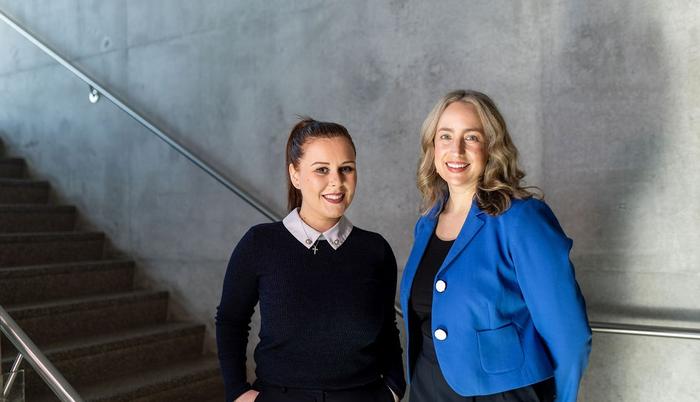Every year, over 15,500 Australians are diagnosed with bowel cancer, and it is the second leading cause of cancer deaths in the country. Over 1,700 (one in ten) of those diagnosed are young Australians aged under 50, and this incidence is increasing.

Credit: Olivia Newton-John Cancer Research Institute
Every year, over 15,500 Australians are diagnosed with bowel cancer, and it is the second leading cause of cancer deaths in the country. Over 1,700 (one in ten) of those diagnosed are young Australians aged under 50, and this incidence is increasing.
There is an urgent need to discover more effective treatments and improve bowel cancer screening, particularly for early-onset bowel cancer (those aged 25-49 years). Australians born in 1990 onwards have double the risk of developing bowel cancer compared with those born in 1950. These younger bowel cancer patients often have poorer outcomes as they typically present with late-stage disease.
Immunotherapy is one of the most promising new treatments for cancer, which involves boosting the ability of immune cells to recognize and remove cancer cells. However, less than 10% of bowel cancer patients respond to current immunotherapies.
The results of a new study published on 6th October, 2023 (U.S ET), in the prestigious journal, Science Immunology, was led by researchers at the Olivia Newton-John Cancer Research Institute. Principal Investigator and Head of the Mucosal Immunity and Cancer Laboratory at the Olivia Newton-John Cancer Research Institute, Dr Lisa Mielke, explained the importance of this research breakthrough.
“We have discovered that an important group of immune cells in the large bowel – gamma delta T cells – are crucial to preventing bowel cancer.”
“Gamma delta T cells act as our frontline defenders in the bowel. What makes these immune cells extraordinary is that they constantly patrol and safeguard the epithelial cells lining the bowel, acting as warriors against potential cancer threats,” said Dr Mielke.
“When we analysed bowel cancer patient samples, we found that when more gamma delta T cells were present in the tumours, these patients were reported to have better outcomes and improved survival.”
The large bowel contains trillions of bacteria, viruses and fungi, collectively known as the microbiome. While some bacteria are associated with disease, others are extremely important for the immune system.
Lead co-author of this study, Marina Yakou, PhD candidate at the Olivia Newton-John Cancer Research Institute, described how this new research may lead to improved treatments for cancer patients in the future.
“We discovered that the amount, and diversity of, the microbiome in the large bowel resulted in a higher concentration of a molecule called TCF-1 on Gamma delta T cells compared to other areas of the gut. This molecule (TCF-1) suppresses our natural immune response, the gamma delta T cells, from fighting off bowel cancer.”
“When we deleted TCF-1 in gamma delta T cells using pre-clinical models, this fundamentally changed the behaviour of these immune cells and we saw a remarkable reduction in the size of bowel cancer tumours,” said Ms Yakou.
“Our world-first research breakthrough paves a new roadmap for developing targeted combination immunotherapies to more effectively treat bowel cancer patients.”
This research discovery also opens up new possibilities for understanding how the microbiome and immune cells in the bowel interact, which could lead to the development of new strategies to lower bowel cancer risk and better screen for bowel cancer.
This is promising news for 36-year-old bowel cancer patient, Elise Stapleton, who was initially diagnosed with reoccurring Endometriosis. However, in January this year, she received a shock diagnosis of Stage 3 bowel cancer.
“After waking up from my surgery to remove endometriosis, the bombshell hit. Instead of a planned keyhole surgery, surgeons told me that they had found a tumour and performed open surgery to remove ‘what they could’. I then had a second operation to remove 20-25cms of my large bowel, follow up chemotherapy in April; and I have side-effects from the surgery and treatment.”
“My life has changed dramatically. After having been through a lot in a very short amount of time this year, I’m now feeling very empowered. I want to help raise awareness with young people that bowel cancer is not just an older person’s disease and to trust your instincts – if something doesn’t seem right, then keep following it up with health professionals,” explained Elise.
“I’m hopeful that this new research may lead to more targeted immunotherapies that will result in less side effects, and hopefully even one day help to design better screening so people can be more accurately diagnosed and treated earlier.”
This research study was made possible with thanks to funding from the National Health and Medical Research Council (NHMRC), Victorian Government acting through the Victorian Cancer Agency, Priority Driven Young Investigator Grant from Cure Cancer Australia Foundation, and a career recovery grant from Veski.
Journal
Science Immunology
DOI
10.1126/sciimmunol.adf2163
Method of Research
Experimental study
Subject of Research
Animals
Article Title
T cell factor 1 (TCF-1) is a critical regulator of intraepithelial lymphocytes in colorectal carcinoma
Article Publication Date
6-Oct-2023
COI Statement
N/A




